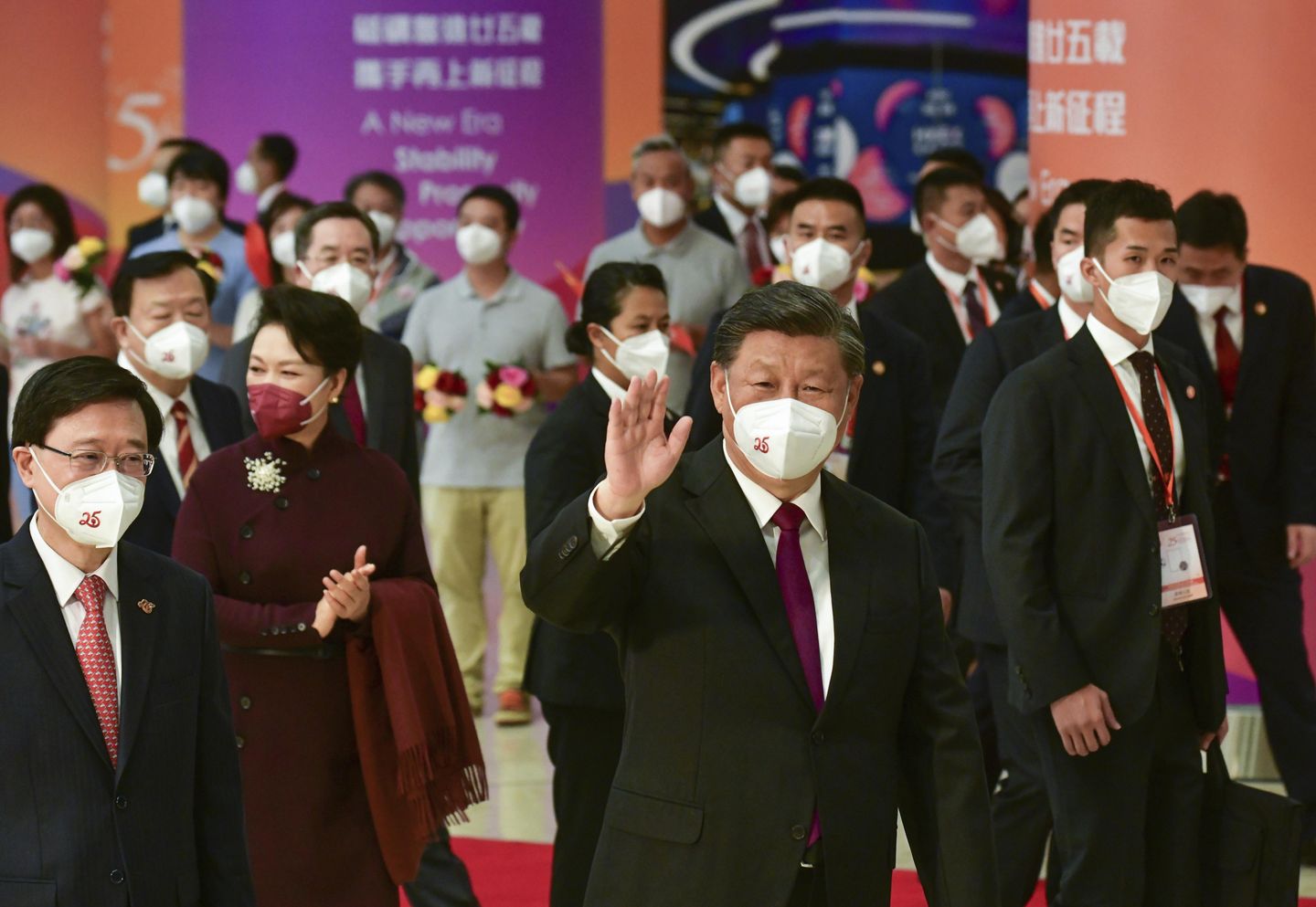

HONG KONG (AP) — China’s leader Xi Jinping marked the 25th anniversary of Hong Kong’s return in a speech Friday emphasizing Beijing’s comprehensive control over the once-British colony under his vision of the “one country, two systems” framework — countering criticism that the political and civic freedoms promised for the next quarter-century have been all but erased under Chinese rule.
Xi praised the city for overcoming “violent social unrest” – a reference to the 2019 massive pro-democracy movement that was followed by a Beijing-led crackdown that has snuffed out dissent and shut down independent media, aligning Hong Kong more closely with stricter controls under China’s ruling Communist Party.
Xi warned that there would be no tolerance for foreign interference or traitors to meddle in Hong Kong’s affairs. He said that “safeguarding national sovereignty, security and development interests” is of the highest priority.
“Nobody in any country or region in the world will allow foreign countries or even traitorous forces and figures to seize power,” he said, adding that only by having patriots governing Hong Kong can it ensure long-term stability.
He said that the framework that promised Hong Kong its own laws and government for 50 years after the 1997 handover from Britain was still a good system that “must be maintained for a long time.”
But he also said that Beijing had “comprehensive jurisdiction” over Hong Kong, and that Hong Kong should respect Chinese leadership, even as Beijing allows regions like Hong Kong and neighboring Macao to maintain their capitalist system and a degree of autonomy.
“After the return to the motherland, Hong Kong has overcome all kinds of challenges and moved forwards steadily,” Xi said. “Regardless of whether it was the international financial crisis, the coronavirus pandemic or violent social unrest, nothing has stopped Hong Kong’s progress.”
Since the 2019 protests, authorities have used a sweeping national security law to arrest scores of activists, media figures and democracy supporters. They introduced a more “patriotic” curriculum in schools and revamped election laws to keep opposition politicians who are deemed not patriotic enough out of the city’s legislature. The changes have all but eliminated dissenting voices and have driven many to leave the city.
In its view, China’s Communist Party has restored stability to a city that was wracked with demonstrations seen as a direct challenge to its rule. For Western democracies, Xi has undermined the freedoms and way of life that had distinguished the city from mainland China and made it into a global finance and trade hub.
U.S. National Security Council spokeswoman Adrienne Watson said in a statement that the dismantling of Hong Kong’s democratic institutions and the pressures on its judiciary, tightening control over academic and press freedoms and the disbandment of civil society groups and news outlets, had “undermined fundamental freedoms to preserve global stability.”
She said that China’s policies toward Hong Kong, including the implementation of the national security law, have “shaken the institutions, rules, and systems that had been the basis of international confidence in Hong Kong.”
“We call on the PRC to act in accordance with the international obligations it willingly undertook,” Watson said.
Xi also stressed the importance of caring for the youth of Hong Kong. A large segment of protesters in the pro-democracy movements in 2014 and the 2019 were students, many of them disillusioned with the loss of promised political freedoms, an increasingly competitive job market and rising housing costs.
“It is necessary to help the majority of young people solve the difficulties they face in their studies, employment, and in entrepreneurship and property ownership,” he said. “There must be more opportunities created for them to grow and become talents.”
Xi’s two-day trip to Hong Kong is his first outside of mainland China since the pandemic took hold in January 2020. He had last visited Hong Kong in 2017 for the handover celebrations.
Security in Hong Kong has been beefed up for his arrival, with designated security and no-fly zones. Thousands of guests were required to take daily coronavirus tests and ordered to check into quarantine hotels ahead of their attendance of events with Xi on Thursday and Friday.
Xi also officiated the swearing-in ceremony of Hong Kong’s new leader John Lee, a former security official who oversaw the crackdown on dissent. Lee pledged to uphold the city’s mini-constitution and bear allegiance to Hong Kong. He also pledged to be accountable to the central government in Beijing.
“The next five years will be a crucial time for Hong Kong to advance from governance to prosperity,” said Lee.
He has previously indicated plans to enact Article 23 in the city’s Basic Law. It concerns local legislation to protect the Chinese government against acts that threaten national security, such as treason, secession, sedition, subversion and foreign collusion.
A similar initiative had to be abandoned after massive protests in 2003.
Amnesty International warned that Lee’s plans to enact laws governing state secrets and cybersecurity will likely “mirror similar laws in mainland China.”
“The extremely broad definition of such laws facilitates arbitrary enforcement, a fact that creates yet more uncertainty and fear for people in Hong Kong,” the watchdog’s Asia-Pacific regional director Erwin van der Borght said in a statement.
At a morning flag-raising ceremony — attended by Lee, his predecessor Carrie Lam and other officials but not Xi — police officers carrying the Chinese and Hong Kong flags marched into Golden Bauhinia Square for the ceremony with the Chinese “goose-stepping” style, replacing a British-style march. Guests stood at attention as the Chinese national anthem was played.
